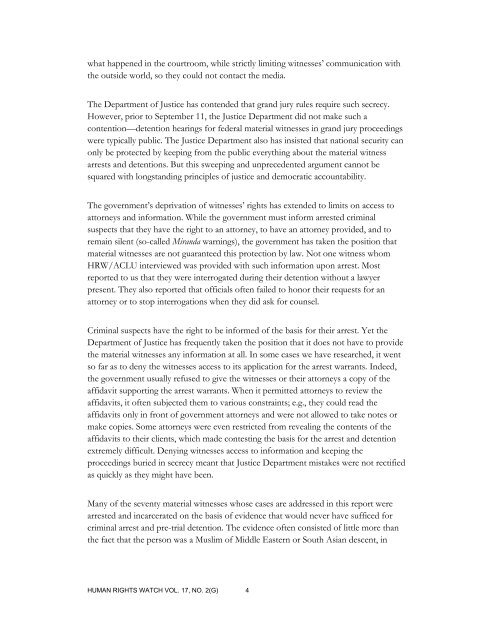Witness to Abuse - Human Rights Watch
Witness to Abuse - Human Rights Watch
Witness to Abuse - Human Rights Watch
Create successful ePaper yourself
Turn your PDF publications into a flip-book with our unique Google optimized e-Paper software.
what happened in the courtroom, while strictly limiting witnesses’ communication with<br />
the outside world, so they could not contact the media.<br />
The Department of Justice has contended that grand jury rules require such secrecy.<br />
However, prior <strong>to</strong> September 11, the Justice Department did not make such a<br />
contention—detention hearings for federal material witnesses in grand jury proceedings<br />
were typically public. The Justice Department also has insisted that national security can<br />
only be protected by keeping from the public everything about the material witness<br />
arrests and detentions. But this sweeping and unprecedented argument cannot be<br />
squared with longstanding principles of justice and democratic accountability.<br />
The government’s deprivation of witnesses’ rights has extended <strong>to</strong> limits on access <strong>to</strong><br />
at<strong>to</strong>rneys and information. While the government must inform arrested criminal<br />
suspects that they have the right <strong>to</strong> an at<strong>to</strong>rney, <strong>to</strong> have an at<strong>to</strong>rney provided, and <strong>to</strong><br />
remain silent (so-called Miranda warnings), the government has taken the position that<br />
material witnesses are not guaranteed this protection by law. Not one witness whom<br />
HRW/ACLU interviewed was provided with such information upon arrest. Most<br />
reported <strong>to</strong> us that they were interrogated during their detention without a lawyer<br />
present. They also reported that officials often failed <strong>to</strong> honor their requests for an<br />
at<strong>to</strong>rney or <strong>to</strong> s<strong>to</strong>p interrogations when they did ask for counsel.<br />
Criminal suspects have the right <strong>to</strong> be informed of the basis for their arrest. Yet the<br />
Department of Justice has frequently taken the position that it does not have <strong>to</strong> provide<br />
the material witnesses any information at all. In some cases we have researched, it went<br />
so far as <strong>to</strong> deny the witnesses access <strong>to</strong> its application for the arrest warrants. Indeed,<br />
the government usually refused <strong>to</strong> give the witnesses or their at<strong>to</strong>rneys a copy of the<br />
affidavit supporting the arrest warrants. When it permitted at<strong>to</strong>rneys <strong>to</strong> review the<br />
affidavits, it often subjected them <strong>to</strong> various constraints; e.g., they could read the<br />
affidavits only in front of government at<strong>to</strong>rneys and were not allowed <strong>to</strong> take notes or<br />
make copies. Some at<strong>to</strong>rneys were even restricted from revealing the contents of the<br />
affidavits <strong>to</strong> their clients, which made contesting the basis for the arrest and detention<br />
extremely difficult. Denying witnesses access <strong>to</strong> information and keeping the<br />
proceedings buried in secrecy meant that Justice Department mistakes were not rectified<br />
as quickly as they might have been.<br />
Many of the seventy material witnesses whose cases are addressed in this report were<br />
arrested and incarcerated on the basis of evidence that would never have sufficed for<br />
criminal arrest and pre-trial detention. The evidence often consisted of little more than<br />
the fact that the person was a Muslim of Middle Eastern or South Asian descent, in<br />
HUMAN RIGHTS WATCH VOL. 17, NO. 2(G) 4
















